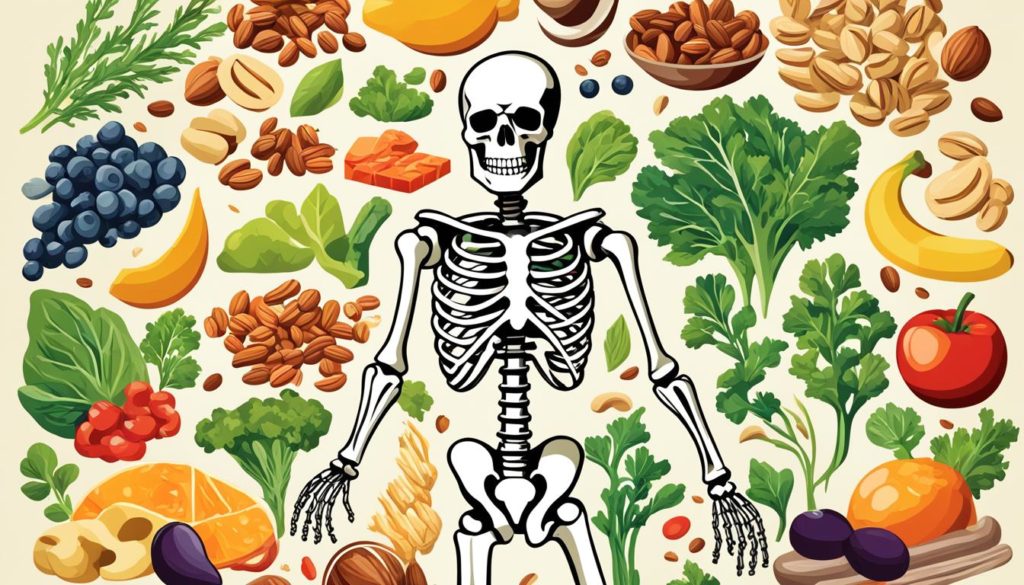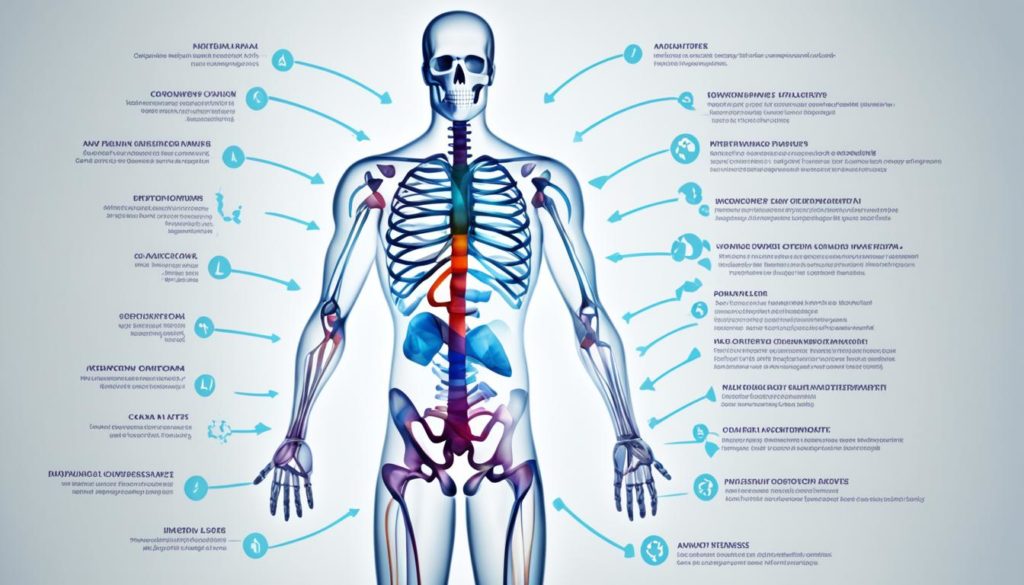Manganese is an essential mineral that helps our bodies in many ways. It supports key functions like enzyme support, bone development, and blood clotting. It also fights inflammation. This important nutrient comes from different foods and supplements.
Key Takeaways
- Manganese is vital for many biological activities in our bodies.
- It aids enzymes, helps form bones, clots blood, and combats inflammation.
- A well-balanced diet usually gives us enough manganese from food.
- Supplements are there to help when food isn’t enough.
- Knowing its benefits and sources can improve your health greatly.
Introduction to Manganese
Manganese is vital for our body’s functions. It helps in many of the body’s biochemical processes. This mineral plays a key role in enzyme functions.
Understanding What Manganese Is
Manganese is an essential mineral that our bodies need. It helps with bone growth, metabolism, and fighting oxidation in cells. The manganese benefits are crucial for our health.

Historical Context of Manganese
Manganese historical use goes back to ancient times, used in glass and metals. Its role in human health only became clear later. It’s vital for metabolic functions and enzyme support.
The Importance of Manganese in Your Body
Manganese is a key mineral that supports many body functions. It is vital for your health and well-being. This mineral is involved in various bodily processes, offering many health benefits.

Manganese Functions in the Body
Manganese is vital for our brain and nervous system. It is part of enzyme systems that help with:
- The formation of connective tissues
- Absorption of calcium
- Proper functioning of the thyroid gland and sex hormones
- Regulation of blood sugar levels
- Metabolism of fats and carbohydrates
These roles of manganese are crucial for life and health.
How Manganese Supports Overall Health
Manganese helps make connective tissues and helps us absorb calcium. This is good for bone health. It also keeps blood sugar levels stable. This helps with our energy and metabolism. Furthermore, it’s important for our thyroid gland and hormones.
So, getting enough manganese is key for staying healthy and living longer.
Health Benefits of Manganese
Manganese is a crucial nutrient that affects many parts of our health. It plays a big role in keeping bones strong, helps our body use energy properly, and defends against harmful cells. Let’s explore the important health benefits of this essential mineral.
Manganese and Bone Health
Manganese is key for bone health. It works with calcium to make bones denser. This strengthens the bones and lowers the chance of osteoporosis.
For healthy bones, the right amount of manganese is vital. It ensures bones form correctly and stay strong.
Manganese and Antioxidant Properties
Manganese is also an antioxidant. It fights off damaging cells in the body. This can prevent many health issues and even slow aging.
By fighting these harmful cells, manganese lowers stress on cells. This keeps our cells healthy.
Manganese in Metabolic Function
Manganese is important for metabolism too. It activates enzymes that help our body process food. These enzymes break down carbs, proteins, and fats, important for energy and balance.
Additional Manganese Health Benefits
Manganese has other health benefits as well. It supports brain health, helps blood clot, and might lessen inflammation. It’s important to get enough manganese from our diet.
For more info on manganese and where to find it, check out Mount Sinai’s supplement guide.
Common Dietary Sources of Manganese
Manganese is a key mineral found in many foods. It helps keep our bodies healthy. It’s important to eat foods rich in manganese to stay well.
Manganese Rich Foods
It’s vital to eat manganese rich foods to meet your nutritional needs. You can find manganese in whole grains, nuts, and leafy greens. Adding these to your meals can keep your manganese levels up. Foods like:
- Pineapple
- Pecans
- Almonds
- Black tea
For vegetarians or vegans, these plant foods are great for manganese. Discover more about how key minerals support your diet.
Naturally Occurring Manganese in Plants
Plants are a main manganese source for many, especially vegetarians and vegans. Eating a variety of plant foods keeps you healthy and ensures enough manganese.
To get more manganese, eat different fruits, vegetables, and nuts. These foods are full of nutrients and taste great. This makes getting your daily manganese easy and trouble-free.
Manganese Deficiency: Causes and Symptoms
Manganese deficiency is not very common. It can happen due to certain medical problems or drugs. Knowing the signs of manganese lacking is key for early help.
- Poor bone growth or skeletal defects
- Low fertility rates
- Glucose intolerance and altered carbohydrate metabolism
- Disrupted lipid metabolism
The causes of not having enough manganese can differ. They often come from absorption problems caused by health issues. Diseases like Crohn’s disease or liver conditions can lead to it. So can using specific medicines for a long time that affect how nutrients are absorbed.
Manganese Supplements: What You Need to Know
Manganese supplements are key for those lacking this mineral in their diets. Knowing the right types and doses is essential. This ensures you get all their benefits.
Forms of Manganese Supplements
Many manganese supplements are available today. Each type has its own absorption rate. It’s important to pick one that fits your needs:
- Manganese Gluconate – Known for its high absorption rate and commonly used for dietary deficiencies.
- Manganese Sulfate – A widely used form that provides a stable, easily absorbed source of manganese.
- Manganese Chelate – Offers enhanced absorption due to its bonding with amino acids, making it suitable for targeted supplementation.
Choosing the Right Manganese Supplement
Choosing the right supplement depends on your needs, health, and doctors’ advice. Different forms work better for different people. A healthcare provider’s guidance is crucial to find the best one for you.
Recommended Dosage for Optimal Health
The recommended dosage for manganese varies with age, gender, and health. Let’s look at the general guidelines:
| Age Group | Recommended Daily Dosage |
|---|---|
| Children (1-3 years) | 1.2 mg |
| Children (4-8 years) | 1.5 mg |
| Adolescents (9-13 years) | 1.9 mg |
| Adolescents (14-18 years) | 2.2 mg (male), 1.6 mg (female) |
| Adults (19+ years) | 2.3 mg (male), 1.8 mg (female) |
Always follow these dosage guidelines unless your healthcare provider suggests otherwise. This ensures safe and effective supplement use.
Manganese Toxicity: Symptoms and Prevention
Getting too much manganese can cause serious health problems. It’s key to know the symptoms of manganese overexposure. Also, how to safely use this mineral is crucial for your health.
Symptoms of Manganese Overexposure
Manganese toxicity can happen from breathing too much in or eating too much. Here are common symptoms of manganese overexposure:
- Neurological problems such as tremors
- Difficulty walking
- Facial muscle spasms
Preventative Measures for Safe Consumption
To keep manganese consumption safe, important steps need to be taken. Here’s what you can do:
- Watch for environmental exposure, especially at work
- Follow the recommended amounts to eat
- Get regular check-ups to catch toxicity early
By taking these steps, you can reduce the dangers of manganese toxicity. This way, manganese stays beneficial for you without causing harm.
Manganese in the American Diet
In the United States, people usually get enough manganese in their diets. Yet, some folks might not consume enough due to their specific eating habits. Learning about manganese in the American diet shows important food sources. This ensures everyone gets enough of this mineral for good health.
Manganese Intake Trends in the United States
Most Americans eat enough manganese. They get it from foods like whole grains, nuts, and green veggies. But, processed foods have become more common. This switch has moved people away from manganese-rich foods. It could lower manganese levels in many people.
Improving Manganese Consumption
To fix this, we need to eat more natural sources of manganese. Adding foods like spinach, brown rice, pineapple, and almonds can help. These foods are not only full of manganese but also improve your overall health. Eating a variety of unprocessed foods is key. It helps everyone get the minerals they need, including manganese.
FAQ
What is manganese, and why is it considered an essential mineral?
Manganese is a trace mineral vital for health. It is key in enzyme functions, bone health, and fighting inflammation. It’s found in certain foods and supplements.
Where does manganese naturally occur?
Manganese can be found in whole grains, nuts, and green vegetables. It’s great for those on a plant-based diet.
How does manganese contribute to bone health?
Manganese boosts bone health by helping with bone density. It works with calcium to form bone and connective tissues. This keeps bones strong and prevents defects.
What are the antioxidant properties of manganese?
As an antioxidant, manganese fights body-damaging free radicals. It helps reduce disease risk. This is because of its role in the enzyme that fights oxidative stress.
What happens if someone has a manganese deficiency?
A lack of manganese can cause bone and fertility problems. It can also affect glucose tolerance. Getting enough from food or supplements is crucial.
What are the symptoms of manganese toxicity?
Too much manganese can cause neurological issues. Symptoms include tremors and difficulty with facial muscles. This often comes from breathing in manganese dust or too much from diet.
What are the recommended dietary sources of manganese?
To get enough manganese, eat whole grains, nuts, and leafy veggies. Pineapples, pecans, almonds, and black tea are also good sources.
How much manganese should one consume daily?
Adult men should get 2.3 mg of manganese a day, and women need 1.8 mg. Always check with a health provider for exact needs.
Are there different forms of manganese supplements?
Manganese supplements vary, like gluconate, sulfate, and chelate. Each type absorbs differently, so choose the best one for your health.
How can overexposure to manganese be prevented?
To prevent too much manganese, watch environmental exposure, especially in certain jobs. Follow dietary recommendations and talk to a doctor for safe levels.


